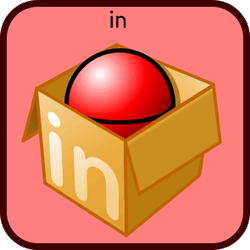Difference between revisions of "Language/English/Grammar/In:-place"
Jump to navigation
Jump to search
m (Quick edit) |
m (Quick edit) |
||
| Line 1: | Line 1: | ||
[[File:2056457.gif|thumb]] | [[File:2056457.gif|thumb]] | ||
<div | <div class="pg_page_title">In: place</div> | ||
"In" is a preposition, a word that links a noun, pronoun, or noun phrase to some other part of the sentence. | "In" is a preposition, a word that links a noun, pronoun, or noun phrase to some other part of the sentence. | ||
| Line 21: | Line 21: | ||
*I believe in the next life. | *I believe in the next life. | ||
== | ==Other Lessons== | ||
* [[Language/English/Grammar/CONJUNCTIONS-→-Correlative-Conjunctions|CONJUNCTIONS → Correlative Conjunctions]] | * [[Language/English/Grammar/CONJUNCTIONS-→-Correlative-Conjunctions|CONJUNCTIONS → Correlative Conjunctions]] | ||
* [[Language/English/Grammar/DEMONSTRATIVE-PRONOUNS|DEMONSTRATIVE PRONOUNS]] | * [[Language/English/Grammar/DEMONSTRATIVE-PRONOUNS|DEMONSTRATIVE PRONOUNS]] | ||
| Line 32: | Line 32: | ||
* [[Language/English/Grammar/Beside-and-Besides|Beside and Besides]] | * [[Language/English/Grammar/Beside-and-Besides|Beside and Besides]] | ||
* [[Language/English/Grammar/Collocations-with-pay|Collocations with pay]] | * [[Language/English/Grammar/Collocations-with-pay|Collocations with pay]] | ||
<span links></span> | |||
Latest revision as of 10:25, 27 March 2023
In: place
"In" is a preposition, a word that links a noun, pronoun, or noun phrase to some other part of the sentence.
Used for a position inside large areas, and in a three-dimensional space (when something is surrounded on all sides).
“In” can also be a city, of country, or place.Used to indicate a belief, opinion, interest, or feeling:
Examples :
- I don't think he's in his office.
- Let’s go for a walk in the woods.
- She grew up in Belgium.
- I last saw her in Times Square.
- He lived in the desert for four years.
- I believe in the next life.
Other Lessons[edit | edit source]
- CONJUNCTIONS → Correlative Conjunctions
- DEMONSTRATIVE PRONOUNS
- Perfect Tenses
- Adverbs of Time
- Punctuation
- Collocations with break
- Contractions
- Since and For
- Beside and Besides
- Collocations with pay
